Nearshoring to Mexico is the hottest trend in supply chains.
With Mexico now the top trading partner of the U.S., two-way trade hit a whopping $68.5 billion, according to data from the Census Bureau. In the first quarter of 2024 alone, trade has grown two percent between the U.S. and Mexico year-over-year (YoY).
This growth in shipping to and from Mexico is truly just the tip of the iceberg as companies invest in nearshoring strategies. According to Mexico’s Secretary of the Economy, there have been 378 foreign direct investments within the last year, and private sector businesses from the U.S. account for nearly 40 percent of it.
This surge is driven by companies moving parts or all their supply chains to Mexico, thanks to geopolitical tensions and disruptions like the COVID-19 pandemic. These have shone light on the gaps and difficulties faced by globally distributed supply chains. Companies seek more stability and budget-friendly solutions, finding hope in Mexico. While nearshoring to Mexico offers such benefits, there are common cross border shipping snags you should aim to avoid.

What are the Benefits of Nearshoring to Mexico?

Location, Location, Location!
One of the largest benefits of nearshoring to Mexico is its location. Mexico’s proximity to the U.S. means faster shipping times and lower costs. It also offers more reliability, making supply chains less susceptible to disruptions.
Potential for Savings
Labor costs in Mexico are currently among the lowest in North America, even cheaper than in China. This can be a major draw for companies looking to reduce operational expenses. Shorter lead times also offer the potential for enhanced productivity and further cost savings.
Positive Economic Impact
Cutting costs and sped-up deliveries mean smoother operations, happier customers, and a boost in productivity. This isn’t just good for your business but beneficial for the Mexican economy, too. Businesses established in Mexico create new jobs and economic growth. The U.S. benefits, too, with stronger, more resilient supply chains that are less vulnerable to global disruptions.
But There Can Be Cross Border Shipping Snags
Many business owners don’t realize the complexities that come with shipping across the U.S.- Mexico border. Working with the right provider can make all the difference in whether you’ll face these common challenges.
Here are four major cross border shipping challenges you should be aware of with your nearshoring strategy.
Security Concerns

Cargo theft is a major concern in Mexico, with hijackings being the primary tactic. In April 2024, Mexico averaged about five cargo thefts per day, according to the National Association of Vehicle Tracking and Protection Companies. Unfortunately, that’s trending up compared to the previous year, that’s a 7.7 percent rise in activity. Most hijackings involve some type of violence and often involve food and beverage goods, household items, electronics, and auto parts.
Another security obstacle is Mexico’s poor highway infrastructure. The quality of Mexico’s roadways is significantly lower than in the U.S. According to the 2019 Global Competitiveness Report, Mexico ranks 49th out of 141 economies in its road quality. In comparison, the U.S. ranks 17th. Mexico’s lacking infrastructure increases the potential risk of delays and accidents, as well as cargo theft with any truck breakdowns.
Despite all this, Mexican carriers are not required by law to carry cargo insurance. Many choose to opt out of having it and this often results in inadequate coverage of freight. Because of this, it’s recommended to look into securing your own extra coverage and aim to work with carriers that are certified with the Customs Trade Partnership Against Terrorism (CTPAT).
Lost in Translation?

When working with those in other countries, it’s important to know how they operate. This includes Mexico. Understanding the language and business culture is essential to achieving success.
This fact may be well-known, but not everyone in Mexico speaks English! Spanish is the official language, spoken by about 90 percent of its people. According to a 2023 report, only five percent of Mexicans speak English. While larger businesses may have more bilingual employees on hand, dealing with smaller ones can be challenging if you do not have someone who speaks Spanish. Also, much technical or industry-specific jargon doesn’t often translate accurately. Without bilingual representatives available, it can be easy to have miscommunication issues.
Unlike the U.S., where we often like to get straight to business, Mexicans often prioritize building personal relationships before even discussing any professional matters. Due to this, negotiations can often be more indirect. Working with Mexican businesses means you’ll need to invest time in building strong relationships to foster trust and rapport with your contacts.
Facing Cross Border Complexities

Getting your freight across the U.S.–Mexico border can be complex. Many parties are involved, including several carriers and the customs broker. There are also several touchpoints during the shipping process, and disruption can happen at any of them.
Another hurdle shippers must deal with in cross border shipping is the lengthy transit time. Due to inspections, typical wait times for trucks crossing the border, especially from Mexico to the U.S., can range anywhere from three to 10 hours on certain days. Choosing the right crossing point can greatly affect the transit time vastly, and there are 48 points to consider!
Paperwork Troubles

Freight most often gets detained at the border for incomplete documentation.
Shippers are required to fill out many, often repetitive documents. It’s common for this paperwork to get misplaced or for shippers to not even be aware of the exact procedures required by authorities. When any of this important paperwork is left blank or filled out incorrectly, the carrier gets detained at the border until it is resolved. This can add extra days or costs to your shipment.
Ensure all necessary documents are in order, including:
- Commercial invoice (in Spanish)
- Bill of lading
- USMCA certificate of origin (if needed)
- Packing list
- Sales contract
- Proforma commercial invoice
- AES filing
- Customs declaration
- Insurance policy
Having these documents in both Spanish and English can prevent delays and misunderstandings.
Trinity Logistics: The Perfect Partner for Your Nearshoring Strategy

Navigating the complexities of shipping to and from Mexico can be overwhelming! One simple mistake is all it takes to cause delays and additional costs. That’s where finding a reliable logistics provider comes in.
Sure, perhaps you can do it all on your own, but trust us, it’s easier with help. You can outright avoid these four common mistakes when shipping to and from Mexico when you’ve chosen to work with a reputable logistics provider like Trinity Logistics.
We’ve been navigating the waters of cross border shipping for over 45 years, so we understand all the nuances. Our bilingual Team Members and Authorized Agents (some even based in Mexico) get the business culture and fluently speak the language, so there won’t be any miscommunication concerns. Not to mention, our People-Centric service always puts relationships first, regardless of nationality.
We’re customs process experts and have trusted carrier relationships ready to roll. Whether it’s Laredo, El Paso, San Diego, or another major U.S.-Mexico border, we have a variety of transportation modes available.
If nearshoring is part of your supply chain strategy but you’re concerned about shipping to and from Mexico, worry no longer. Instead, consider Trinity Logistics as your cross border copilot. We’ll handle the logistics so you can meet your business goals.
Get a FREE Quote Discover Effortless Cross Border ShippingCargo theft and fraud is a common topic in many circles these days. No matter where we look, we see it mentioned in news headlines and see its impacts on price increases on the store shelves. In fact, CargoNet recently shared data showcasing that cargo theft has reached a 10-year high, increasing 59 percent year-over-year (YoY) in the U.S. alone.
While cargo theft and fraud have always been a risk in the world of logistics, the kind of theft and fraud we see today is evolving from what we used to know. Years ago, common cargo fraud involved extortion attempts via loads held hostage as well as t-check scams, where bad actors would book shipments and ask for a fuel advance, take the money, and disappear, often without completing delivery or even picking up the shipment they received the payment advance for.
While these kinds of fraud still occur, they are not as prevalent as they once were. Today’s cargo theft and fraud involve new strategies, and it’s important that companies stay aware of emerging tactics and remain vigilant to protect themselves from unnecessary and tragic losses.
The Evolution of Cargo Theft and Fraud
In the past, cargo theft was commonly known as the act of stealing from a truck or even unlawfully taking cargo from a storage facility. Usually this might occur when the truck driver was asleep or when the parked truck was left unattended in an unsecured lot. Now, cargo theft claims for lost product can be especially difficult to navigate as many insurance carriers have specific language and exclusions written within the pages of cargo policies limiting circumstances under which they will cover cargo payment for cargo theft incidents.
For example, some policies may dictate that the truck must travel within a specific radius only and cannot be left unattended unless in a secured lot. Unfortunately, the definition of “secured lot” is wide-ranging and debatable. Does “secured lot” mean there’s a locked fence, good lighting, cameras, surveillance, or a physical security employee on patrol? There’s simply a lot of confusion and unknowns when it comes to cargo theft in general.
The Federal Trade Commission (FTC) recently reported that the top scam type for 2023 involved imposters. We in logistics and other sectors have been experiencing this concept. Scenarios expand beyond just plain and simple identity theft, at least in the logistics industry. The current phase of cargo theft involving identity misappropriation is very strategic. In fact, CargoNet also shared data that strategic theft has increased 430 percent year-over-year (YoY). As quoted by Scott Cornell of Travelers Insurance, “Strategic theft is when they use various means to trick you into giving them the freight and that’s through methods like identity theft, fictitious pickups, double brokering scams, those methods are where we’re seeing the biggest increase over the last 18 months.”
This strategic cargo theft makes incidents that were already puzzling that much more difficult to solve. This kind of cargo theft often spans over multiple state lines (interstate) as opposed to intrastate. When this occurs, jurisdiction is not given to local or state authorities but may extend to federal jurisdiction. However, to establish a case seeking federal help, not only would more than one state need to be involved, but the cargo value must warrant federal attention to exceed $100,000 and perhaps even $500,000 or more, depending on the states involved. You may have police consider strategic cargo theft a civil matter that will not be taken under investigation.
Further, with these scenarios, there is confusion concerning who takes or issues the theft report Should that be the shipper, the receiver, or the freight broker? Is the report filed with law enforcement jurisdiction at the origin where freight was often last seen, or should reports be filed at the delivery jurisdiction, where the cargo never arrived? The cargo owner may attempt to file a police report where the transfer of goods occurred, which is the location where the driver took possession of the cargo for transport.
The State of Strategic Cargo Scams
Certain states like California and Texas have become hotspots for these strategic cargo scams, often involving imposter identities. Many of these fraudsters operate outside the U.S., finding and exploiting weaknesses in the system so products may end up outside the country. This further hurts the U.S. economy when items are produced here and those companies don’t get a financial return, thus losing money that should be going back into the economy. There are other additional costs affecting manufacturers to consider, such as lost time, materials, and labor to duplicate the goods that were originally stolen.
The Federal Motor Carrier Safety Administration (FMCSA) system, originally designed to verify motor carrier legitimacy, has become a target. Phishing scams and other methods have targeted carriers with a motive to change a carrier’s contact information and use their MC authority for nefarious purposes. Bad actors have been caught posing as valid, reputable carrier companies. They often go as far as creating web domains similar to those of established carriers or caught purchasing MC numbers from those going out of business or wishing to exit, especially with the recent market slowdown, with the new buyer updating that company’s contact information. They look and “run” as the previous motor carrier, using that previous authority and reputation to run their scams. This facade allows them to gain possession of or intercept the cargo and divert it to a pre-arranged location for a quick disappearance. The FMCSA is aware of these trending cargo theft scams and is actively looking to improve their vetting and even get rid of MC numbers for carriers.
There’s also a prevalence in double brokering. This is when an unauthorized carrier accepts a shipment or assigns it to another carrier lacking the proper authority to broker it in the first place. It can also involve the re-brokering of shipments without authorization to legitimate entities with broker authority. This creates a chain of uncertainty and lack of control over carrier selection while increasing the likelihood of unpaid delivering carriers, and double payments required from freight brokers and shippers, paying more than agreed for delivery services.
Load boards, while usually valuable tools for shippers and freight brokers to connect with available carriers, are also now breeding grounds for fraud. Fake postings and compromised information have created a haven for scam artists. The more information presented on a load posting, such as commodity, value, or even location, the more opportunity for these scammers to successfully replicate fake loads and even steal rate confirmations from legitimate actors. Detailed information provided on load boards make loads easier targets for those with motive to engage in strategic theft and double brokering.
Cargo fraud involving identity theft is not limited to carrier companies. Scammers also pose as shipper companies. These shipping requests will often come in as inbound leads rather than relationship leads. Scammers create fake web domains and use reputable companies to gain credit access, then use that access to pose as both a shipper and carrier. They’ll orchestrate this fake shipment of theirs, make it look as if it has been delivered with forged paperwork, and collect payment before being found out.
A lot of these shipments involving strategic cargo theft end up being diverted to alternate warehouses. In these cases, it is common for the carrier booked to be legitimate but for a bad actor to somehow get in the middle and divert the driver to deliver to a different location altogether, promising an increase in money. Once the freight arrives at the alternate location, there’s a truck en route or waiting to whisk away the freight quickly. Diverted items do not stay in one place for long, making it difficult to track and recover the cargo.
How to Be Proactive and Prevent Cargo Theft and Fraud
Trust, But Verify
Whether dealing with a shipper company or carrier, thorough verification is needed.
For shippers requests, use sources like ZoomInfo, LinkedIn, and Google. Research the company along with the contact who reached out. Remember that most shipper scams involve inbound leads as opposed to solicited new business or existing relationships. Before agreeing to arrange or transport the movement of goods, use Google Maps to ensure the requested pickup and delivery locations are legitimate.
For example, if the shipping company is a well-known business but Google Maps Street View shows you a location that doesn’t look like one of theirs, something might be off. Another red flag could be if the commodity to be shipped doesn’t line up with their standard business, such as an electronics company trying to ship lumber or rice.
For carrier requests, first vet that they have authority to operate with the FMCSA. View their safety rating and be cognizant of shipper or load-specific requirements, such as drivers who have TWIC cards, and commodity specifics, like cargo type and value. Confirm the carrier has adequate insurance coverage for the shipment they are booking, such as reefer breakdown coverage, if they are to haul a temperature-controlled shipment. Cross-check any other shipment requirements, such as interstate authority or hazmat certifications.
Review relationship and load history if they have a shipment history with you and ensure the new request lines up with previous hauls. Be aware of MC misappropriating. Check if the FMCSA information or profile has recently been updated. Some things to look out for are contact, address, or email address changes. Double-check that the carrier company is not associated with any known bad actors and adhere to your company’s own internal vetting standards.
There are various informational and vetting applications like Highway and Truckstop to further qualify carriers. Ensure the equipment the carrier owns lines up with the equipment required for the shipment. For example, it wouldn’t make sense if a carrier books a temperature-controlled shipment when the carrier owns no refrigerated trailers.
Use Relationships, Limit Load Boards
While load boards offer convenience, strong relationships with carriers provide a significant advantage. Building trust and gaining a deeper understanding of their business reduces your risk of cargo theft and fraud.
When load boards are needed, be strategic with your postings and focus on the security of the information you share. Scam artists often use load boards as a resource for information to replicate or find their next victim. They often look at the locations, the kind of cargo, and more. Avoid posting detailed descriptions of your cargo. Keep the information you share as simple and minimal as possible. Protect that information until the carrier has been both vetted and confirmed.
Trust Your Gut
If something feels wrong at any time, report it to your Risk Team or dedicated personnel right away. With cargo theft, time is of the essence. The first 48 hours are critical as stolen freight typically doesn’t stay in the same place very long. Your best chance of recovering it is within those early hours of noticing it.
Your first line of defense to prevent cargo theft and fraud incidents is your pickup location. Those workers have the eyes and, hopefully, surveillance to see if the truck coming in is the right one. They can check that the MC on the truck is correct, that the driver has the right equipment for that shipment’s requirements, that the driver is the one booked, and that they know the correct location they need to deliver to.
Shippers can also be proactive and place trackers in with their freight, which can be beneficial for trip progress tracking as well if the load gets stolen. While many carriers do have trackers these days, it’s best not to rely solely on them. Scam artists have been known to disable trackers or ping them to another cell phone, making the shipment look like it’s traveling where it is supposed to go, while it is, in fact, stopped or delivering to an alternate location.
Shippers can also ensure they use strong seals that are tamper-proof. Ensure your dock workers are informed and proactive in reducing potential incidents. Shippers may also consider investing in extra shipper’s interest for its product, for a first-party insurance policy which provides a layer of extra protection. Develop strong relationships with the freight brokers you work with. Know who the emergency personnel are on the shipper and broker side and be armed with their contact information so you know exactly who to contact at all times of the day should a theft or another emergency occur during shipping.
Knowledge is Power
Stay in the know of what’s going on and trending in cargo theft and fraud by networking with known associations, like CargoNet and the Transport Asset Protection Association (TAPA), as well as the additional connection of the Transportation Intermediaries Association (TIA) for freight brokers. These organizations constantly educate on evolving threats to keep members aware.
Ensure you have an emergency plan in place and educate your team so you can be well prepared for an incident. Develop relationships with law enforcement and investigation agencies who can help you put the word out about your loss and assist in finding your freight or the scam artists involved.
Combatting Cargo Theft is a Shared Responsibility
Combatting cargo theft and fraud requires collaboration from all within the logistics industry. Shippers, brokers, carriers, legislators and law enforcement must work together to create a more transparent environment with strict accountability to make it more difficult for thieves and fraudsters to operate.
Cargo fraud is growing, and tactics are ever-changing. Even with all the right measures in place, fraud may not be 100 percent preventable. That said, though we can’t stop it all, we can implement not only prevention measures but response strategies. By staying vigilant and educated, we can collectively demonstrate to these bad actors that it’s not worth the effort anymore. It is up to us to create a future where the movement of goods is more efficient and secure than it is today.
Get More Content Like This In Your InboxAbout the Author

Kristin Deno currently holds the role of Director of Operational Risk at Trinity Logistics. Deno holds a Certified Cargo Claims Professional certification through the Certified Claims Professional Accreditation Council (CCPAC), with almost 15 years of experience and knowledge in claims, insurance, compliance, and risk. She has a passion for knowledge and servant leadership, always looking to grow professionally and share her expertise to those interested. She’s well known at Trinity for assisting fellow Team Members, Shippers, and Carriers with complex claims and doing all she can to mitigate any potentially concerning scenarios. Deno consistently looks for opportunities to share her knowledge and insight outside of Trinity, having recently attended the TIA’s 2023 Policy Forum in Washington, D.C., Traveler’s and CargoNet’s Cargo Theft and Transportation in Q4 2023, and the TAPA T1 National Cargo Theft Summit in May 2024.
After several record setting years, 2023 saw shifts to the freight market. How did the 2023 freight market affect shipper and carrier businesses? Did other businesses have the same struggles as yours? Are they expecting to face similar difficulties in 2024? How are their partner relationships?
Trinity Logistics wanted to get answers to these questions for you, so we asked a random sample of our shipper and carrier relationships to gauge the effect 2023 had on their business and what their expectations for 2024 in our first Freight Market Survey. Here’s what we found out:
2023 SHipper & Carrier Data: Freight Market Survey Results
Past Challenges – Same, But Different
Considering the recent turndown of demand and the freight market, it’s not a big surprise that money was the biggest issue for shippers and carriers alike. Shippers answered that transportation costs were their biggest challenge in 2023, with supply chain delays/disruption and capacity not far behind. Low rates and increasing operating costs were the main challenges facing carriers.
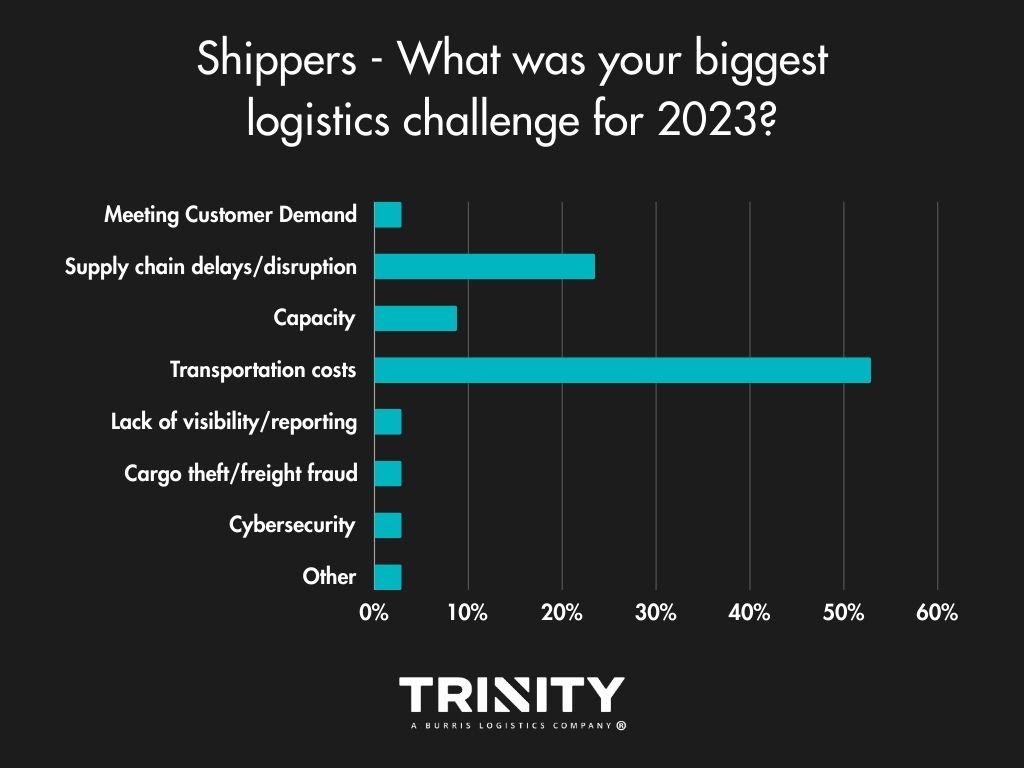
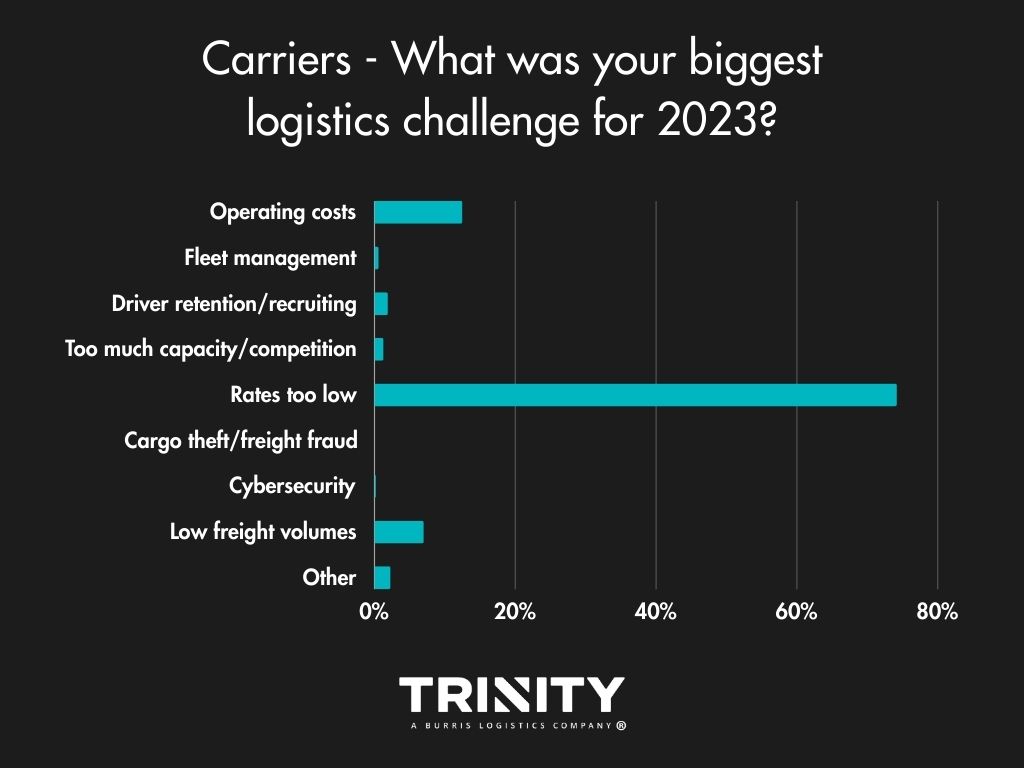
Business Impact – Could Have Been Better
Even with the change in consumer demand trending downwards throughout 2023, most shippers answered that their year was good overall. Carriers on the other hand seemed to face a rougher year in business with over half of them stating their year could have been better or was poor.
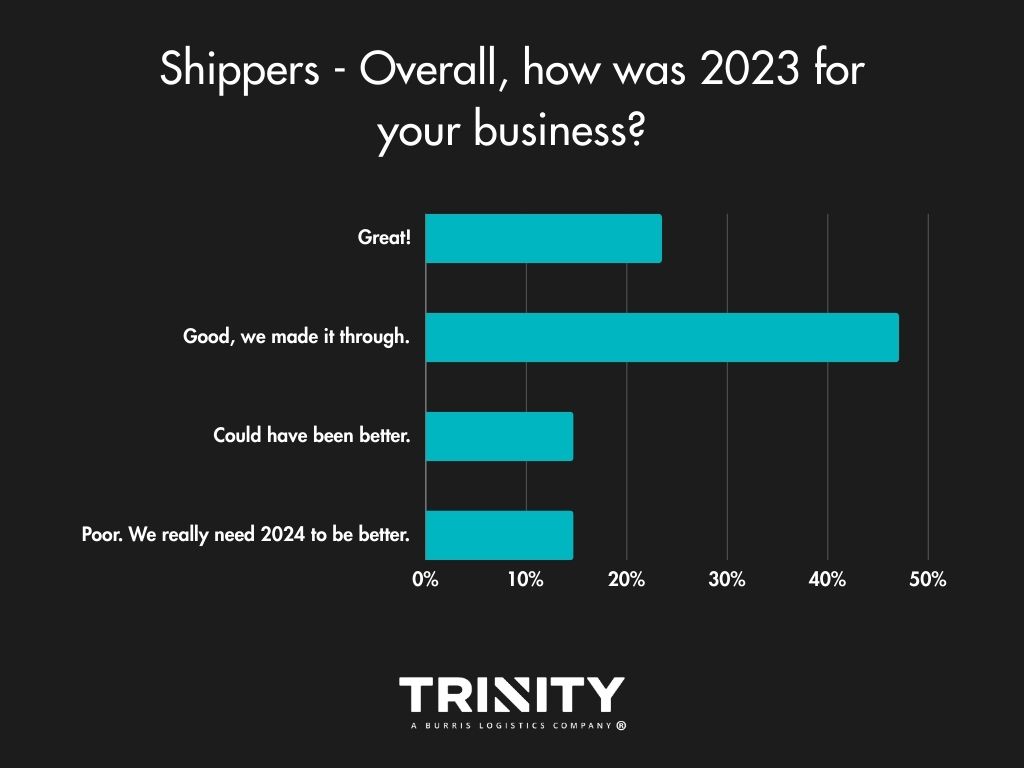
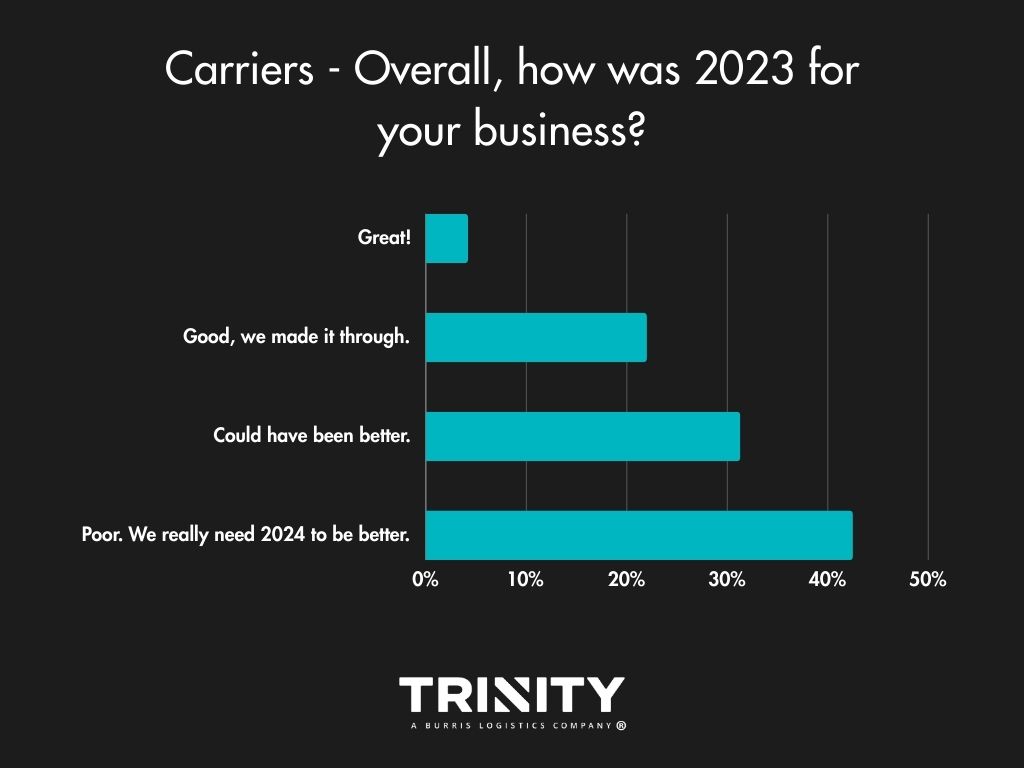
A LOOK INTO 2024
Future Challenges – Money Problems
2024 isn’t looking much different in terms of challenges compared to 2023. Shippers look to have the same financial challenges as they did in 2023 with transportation costs, supply chain delays/disruption, and decreased demand being the top concerns selected. Carriers are still concerned about low rates, operating costs, and low freight volumes hurting their businesses.
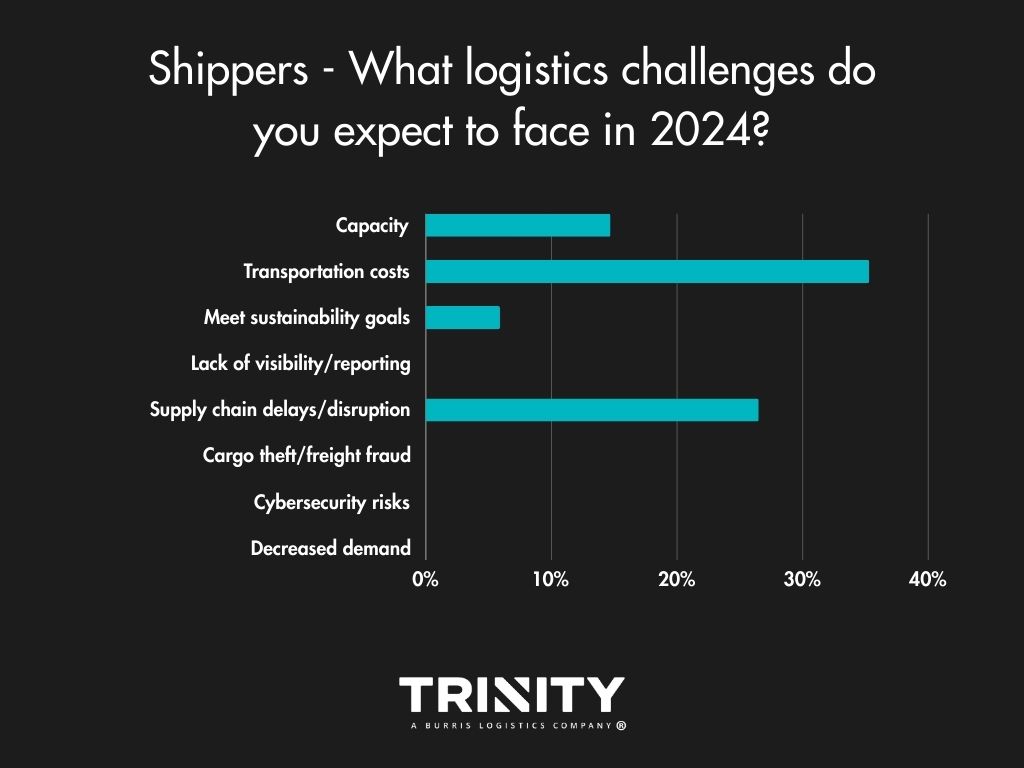
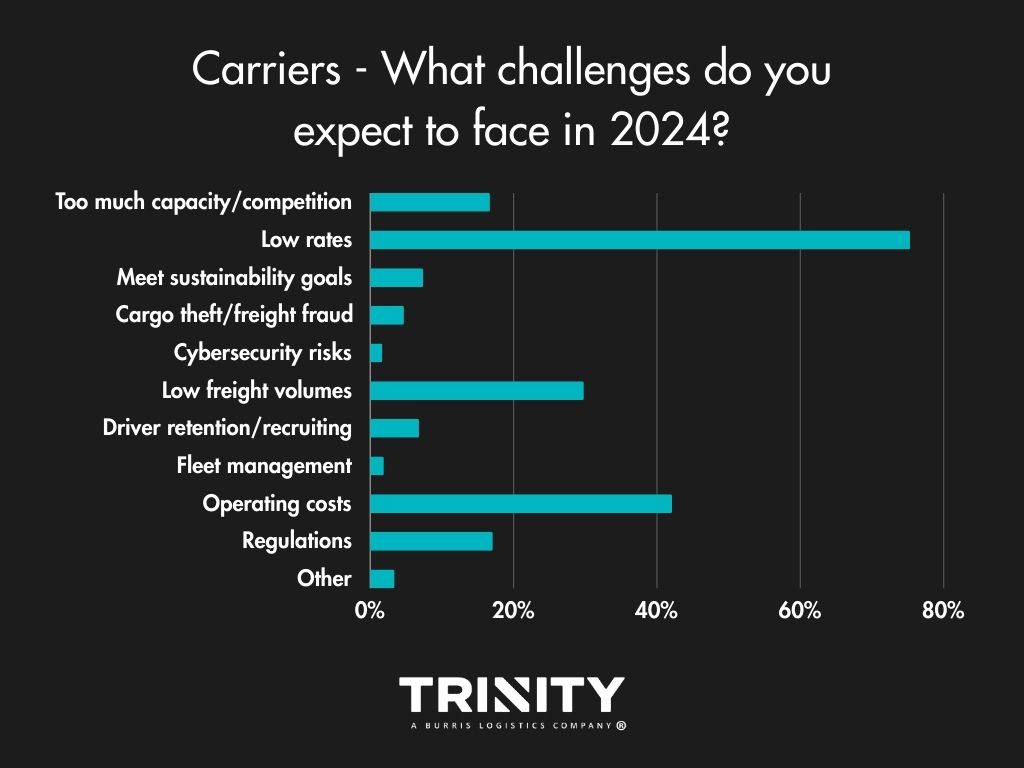
Hot Trends
Even though transportation costs are shippers’ strongest concerns in their previous answers, it seems the increased amount of supply chain disruptions and delays we’ve all experienced in these recent years have hit a nerve, with the majority answering that supply chain resilience is the trend their business is most interested in. Cybersecurity also looks to be a growing interest.
Carriers on the other hand, interestingly enough, look to the recent trend of Artificial Intelligence (AI). Also, as noted in the comment boxes of our “Other” option, increased rates and better fuel prices were trends they’d like to see in 2024.
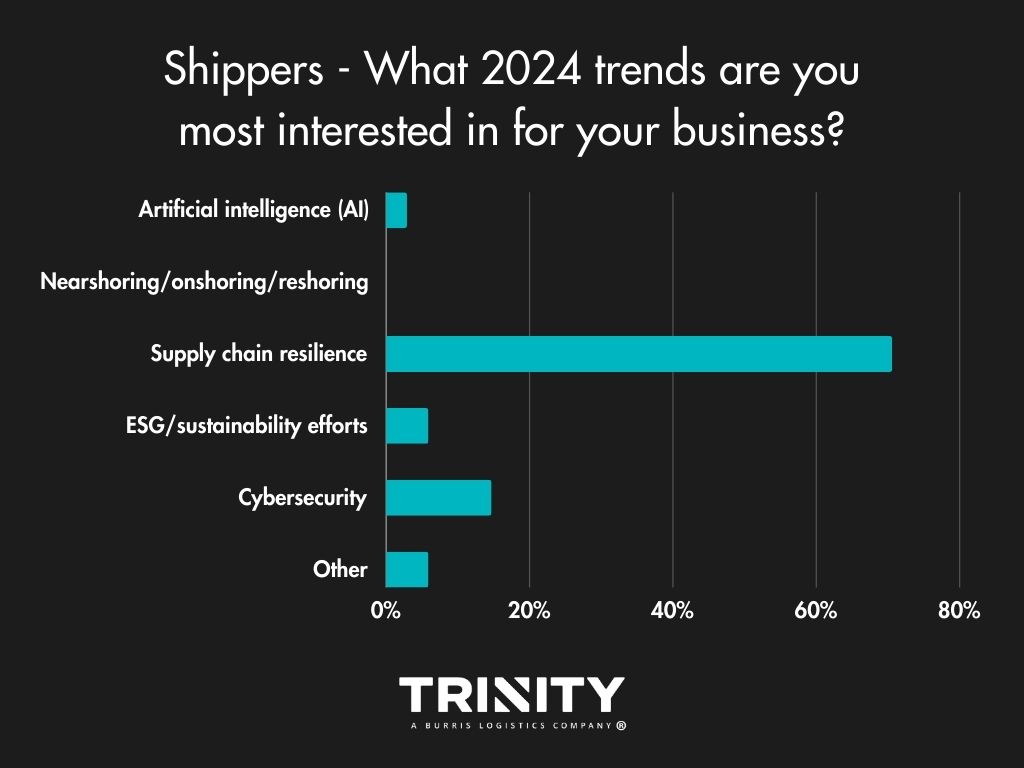

Load Volumes & Capacity – Slightly Positive Outlook
Overall, shippers are slightly more optimistic for 2024, thinking it won’t bring any change or the change it brings will be positive. Most think load volumes will stay the same or there will be a little more in freight volumes this year. As for truck capacity, they think it will be the same as 2023 or slightly tighter.
Carriers also think 2024 will bring more freight volumes and that capacity will likely stay the same or get tighten slightly versus 2023.
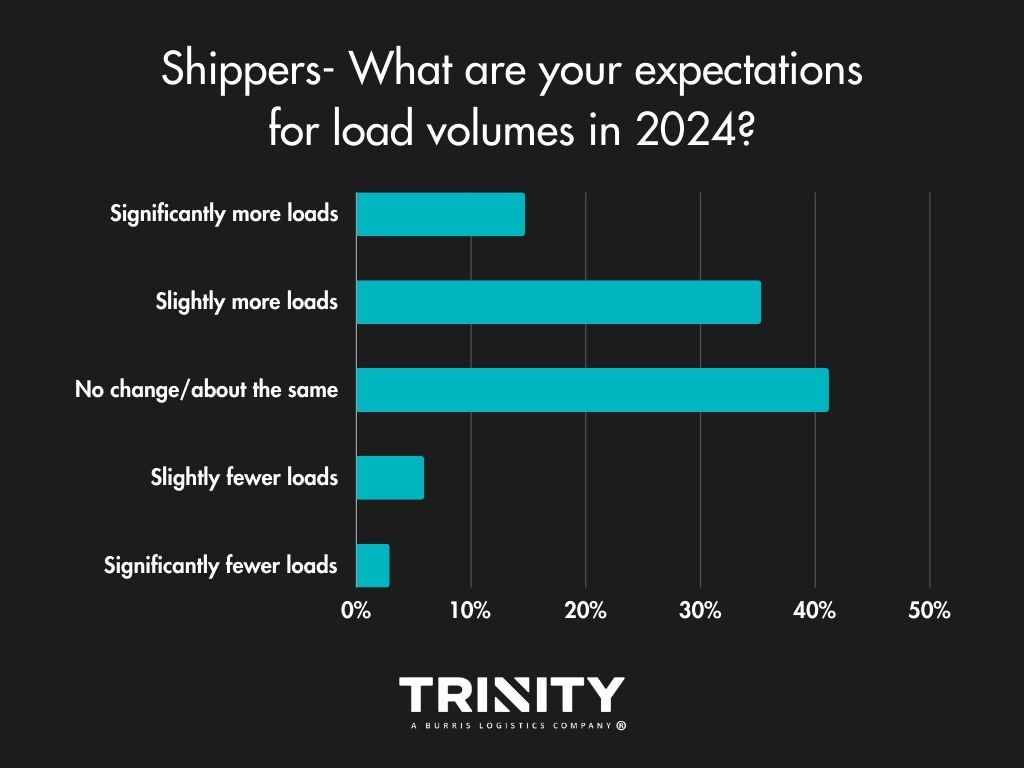
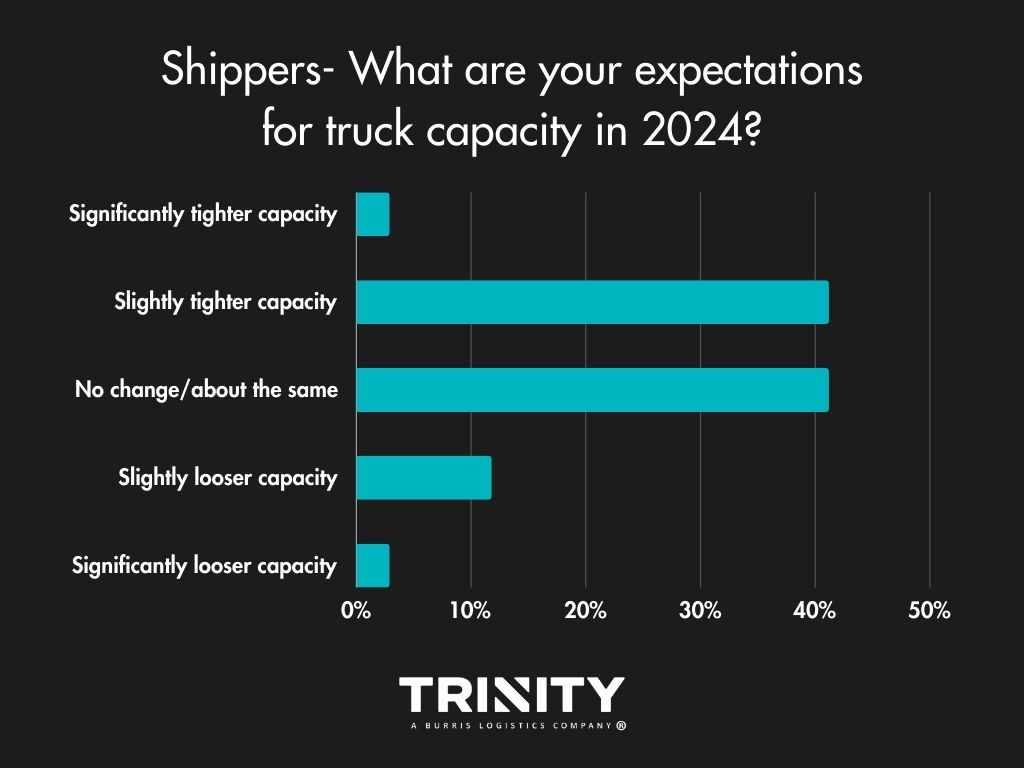
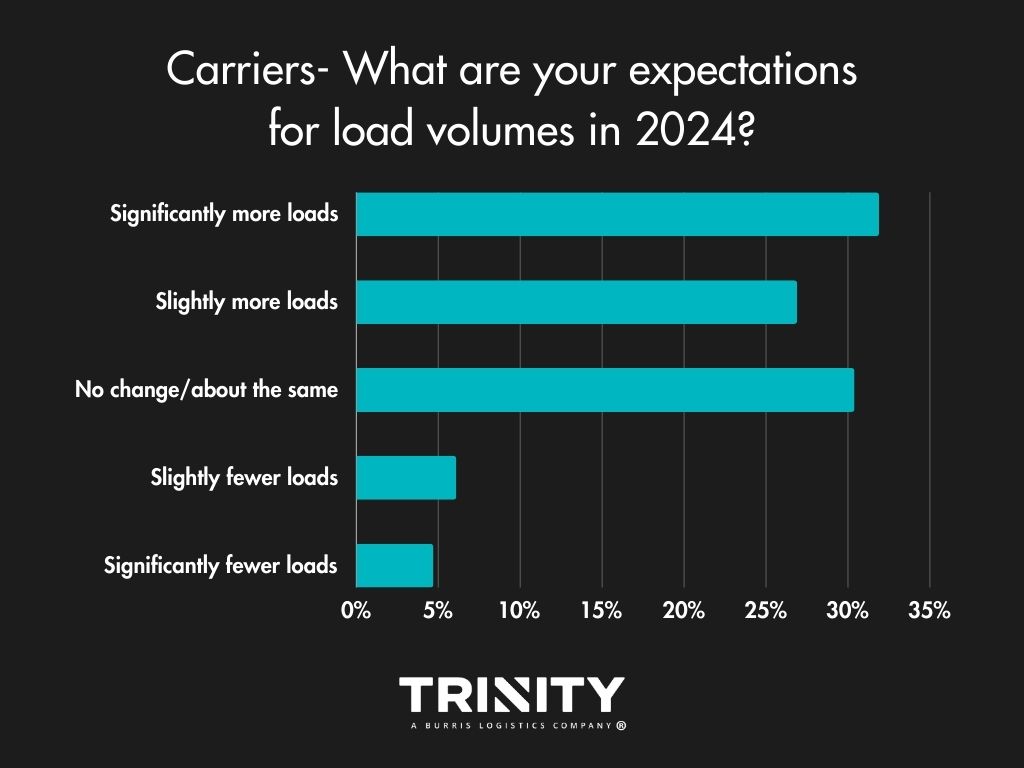
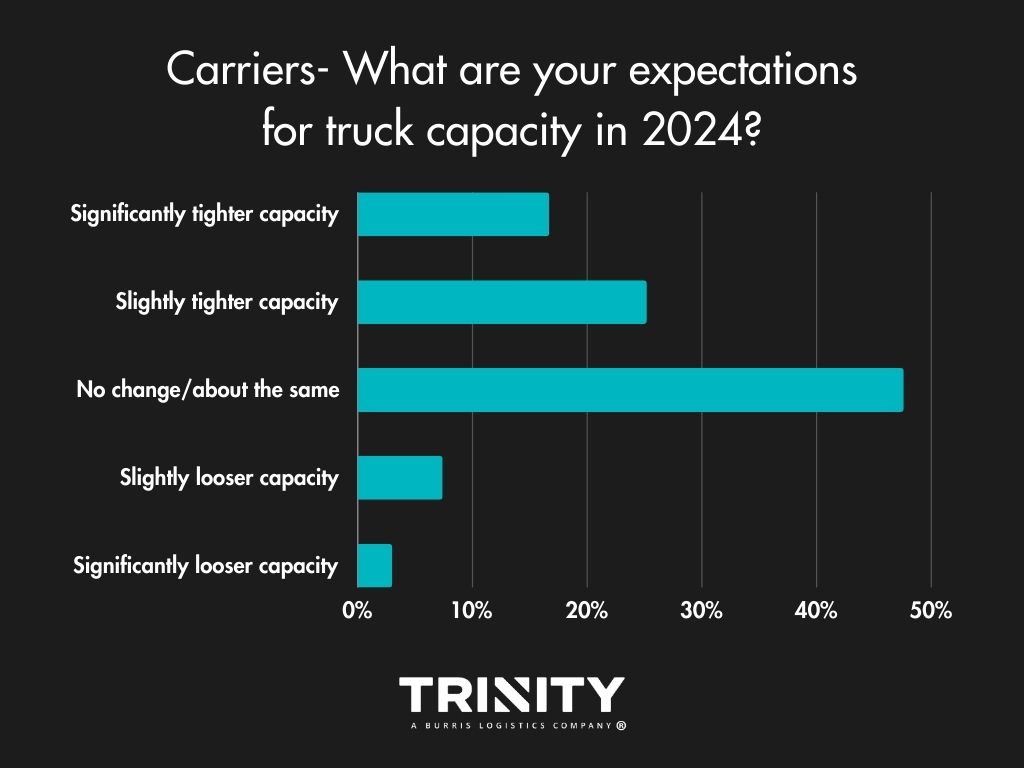
Spot or Contract?
Year-over-year, shippers aren’t looking to change much in terms of which market they turn to. Most look to continue to put most of their freight on the spot market.
For carriers, there looks to be some change anticipated. In 2023, most carriers ran spot market freight but in 2024, over half of them look to haul contracted freight.
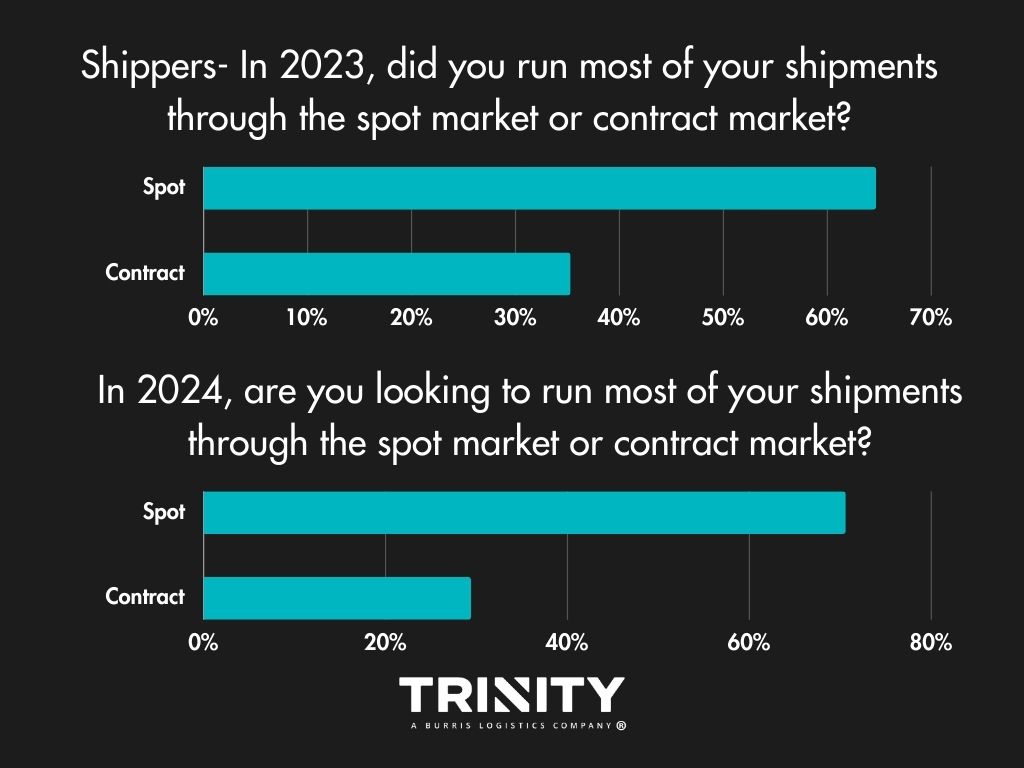
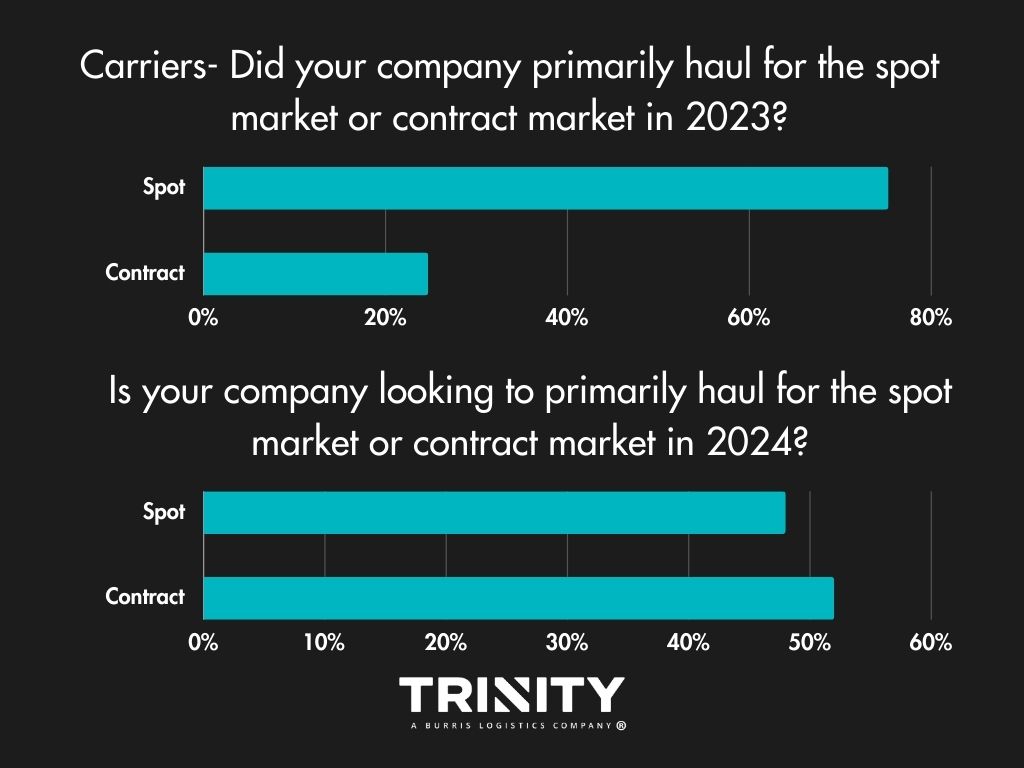
Do Shippers Have a TMS?
It’s 2024, so you’d think most shippers would have a transportation management system (TMS), and no surprise, they do. For those that don’t and answered, it seems they did not have a good experience with one in the past or don’t know enough about them.
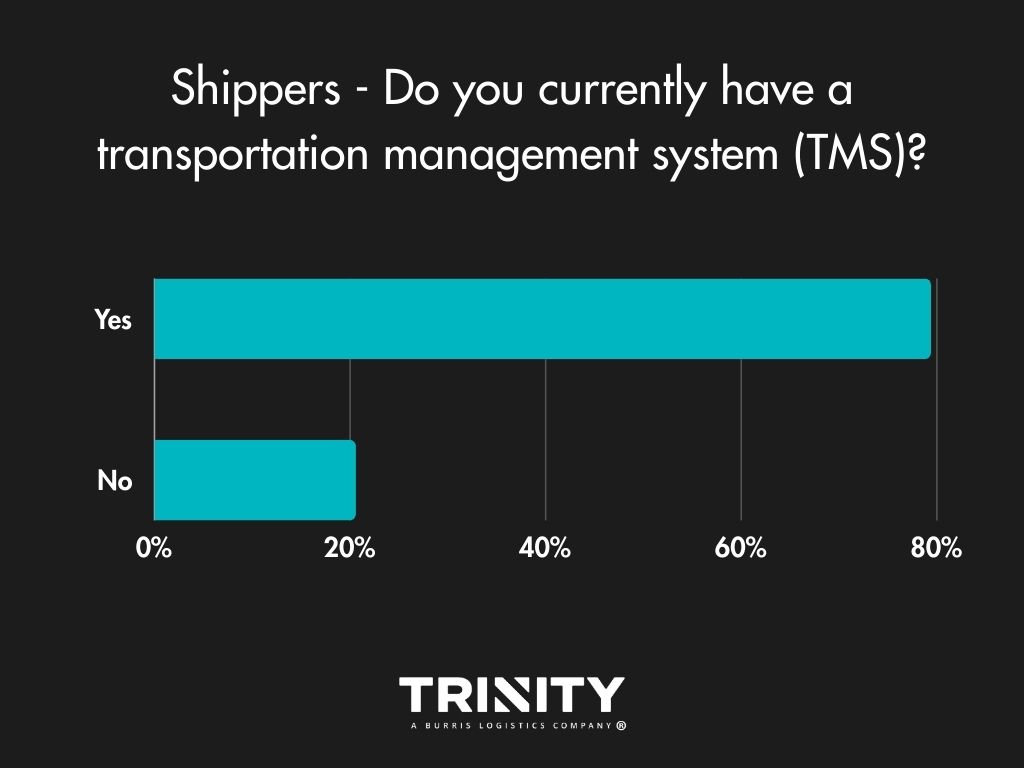
Brokers Are the Way to Go
When asked how they like to move their shipments, most shippers use a mix of carriers and third-party logistics providers (3PLs) or just 3PLs. A few do use their own trucks. For those that do outsource to 3PLs, they usually just stick to one provider.
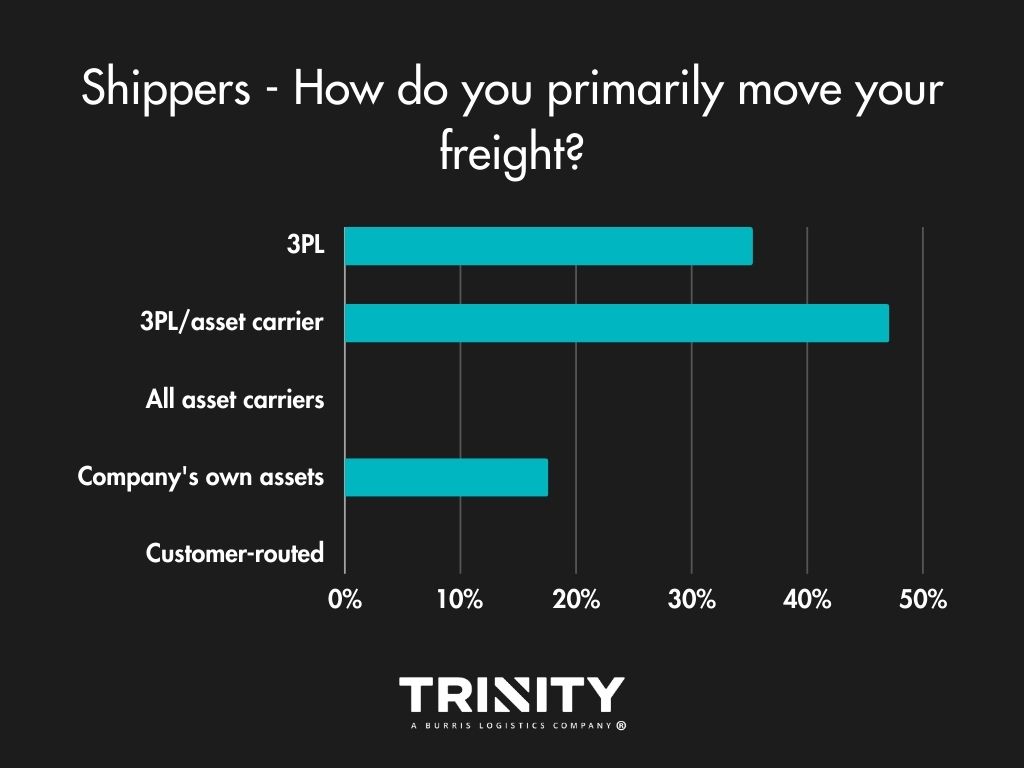
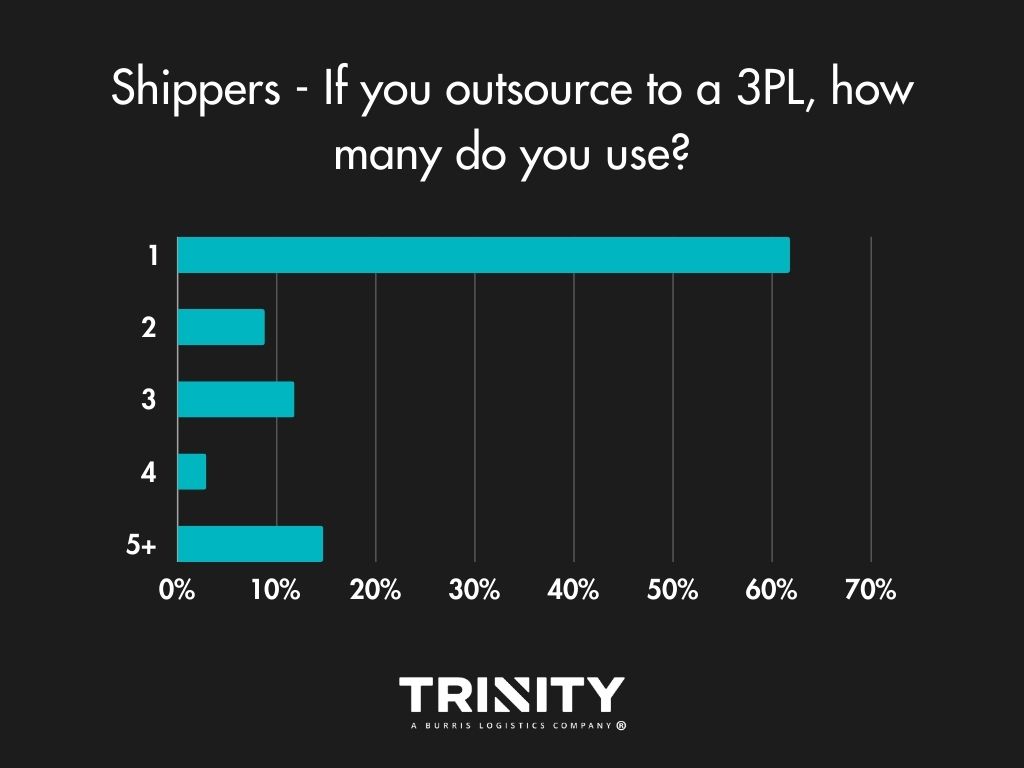
Shippers most often look to a 3PL for help with their everyday shipments, for transportation management, visibility, and access to their capacity. The main reason shippers choose not to work a 3PL for their logistics? They don’t like the risk.
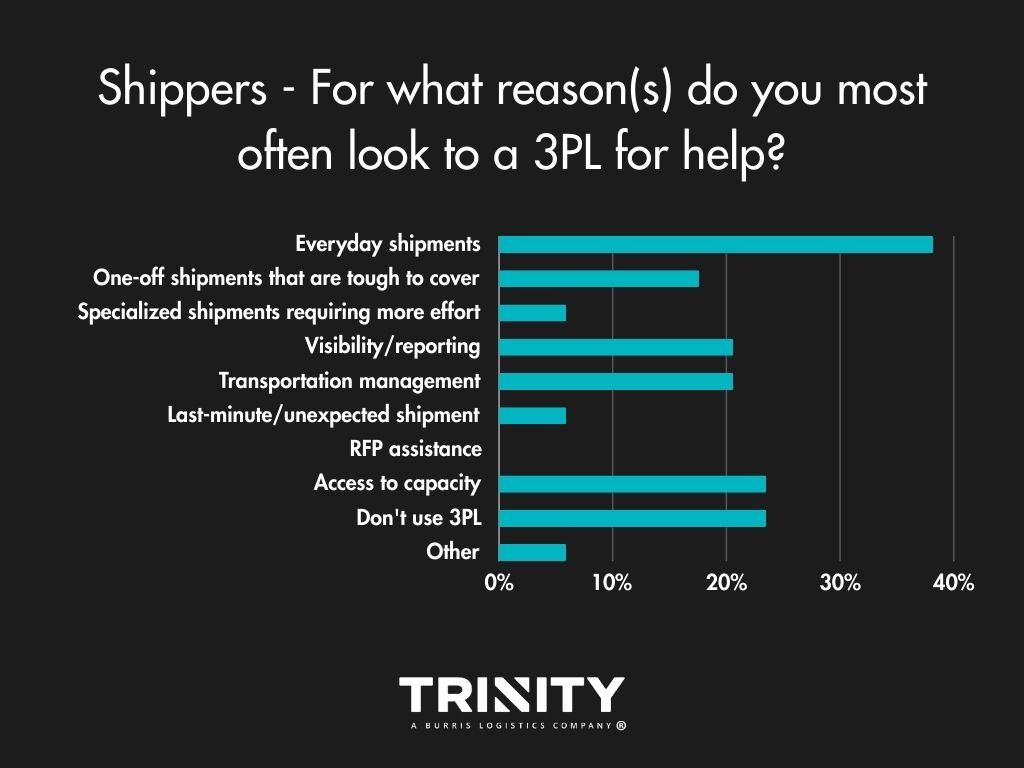
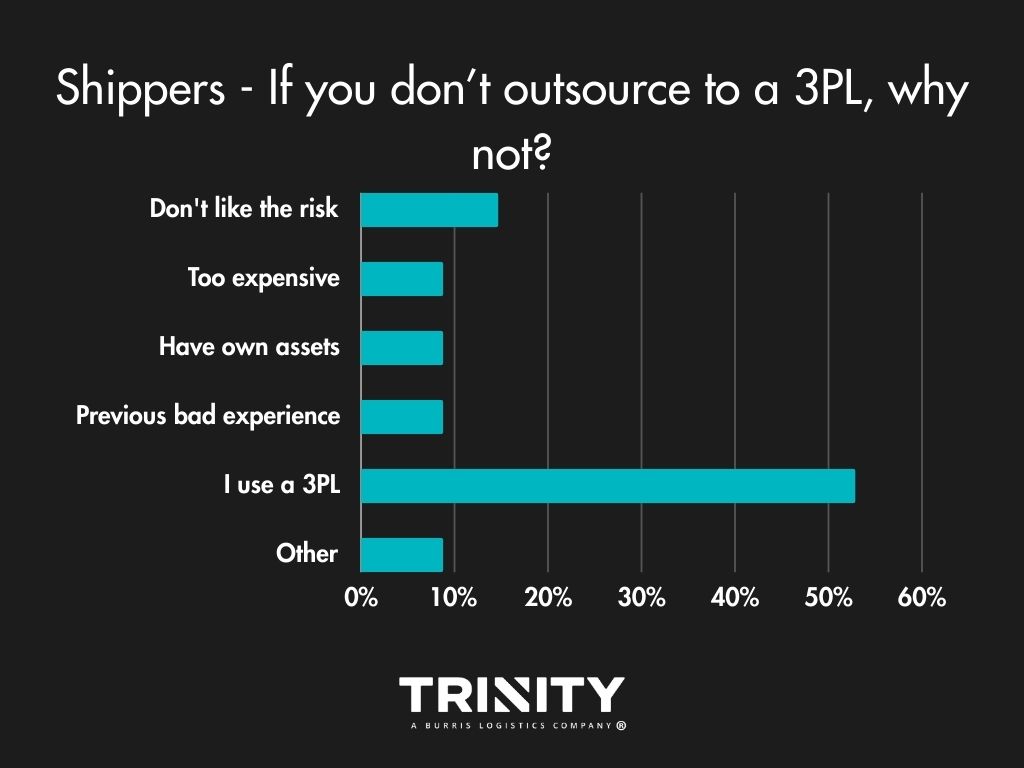
Transportation Modes – Staying Consistent
Overall, shippers aren’t looking to change what transportation modes they use for their shipments. Truckload and less-than-truckload (LTL) are the primary modes they like to use, with a little diversification sprinkled in.
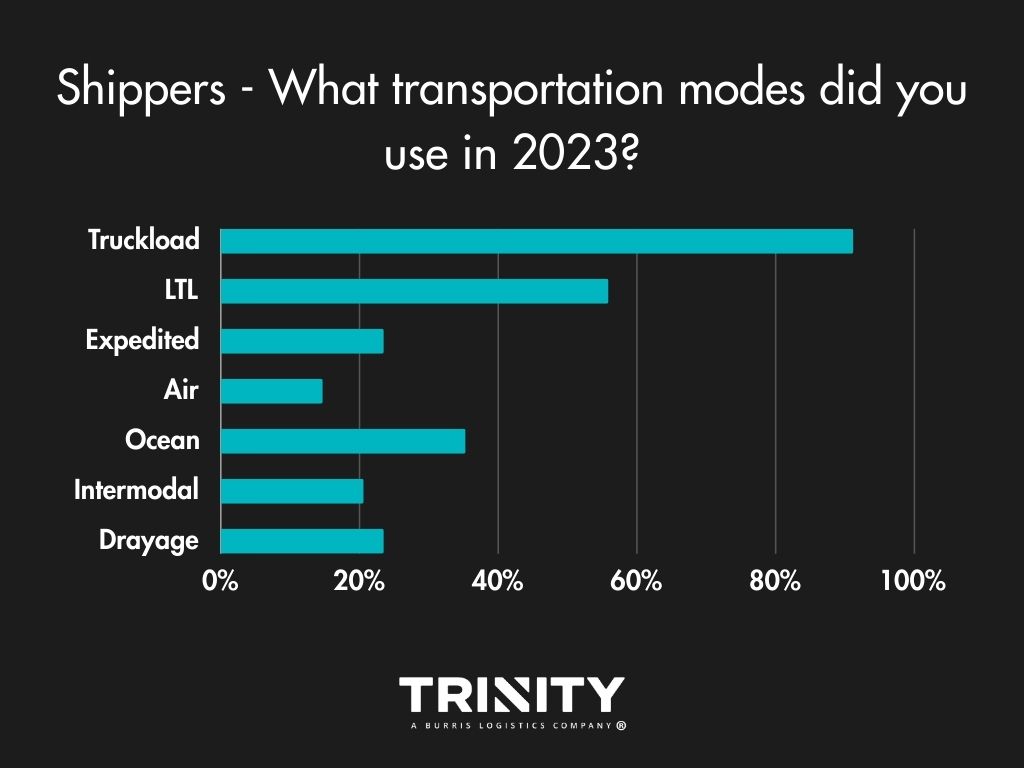
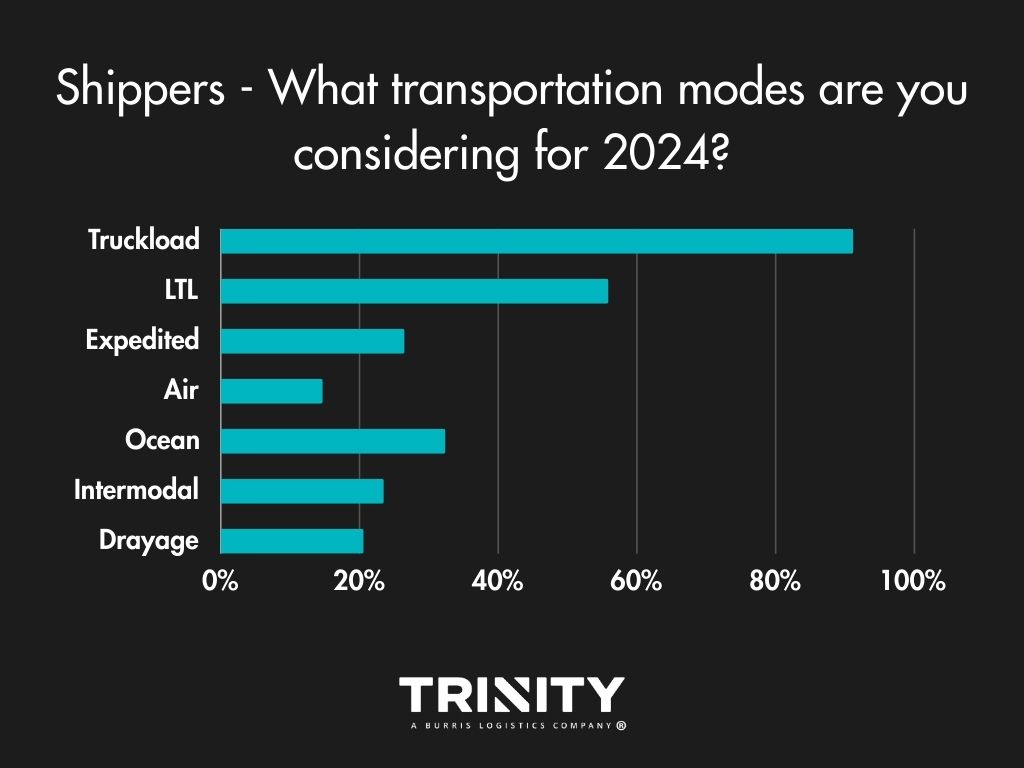
Exceptional Service Stands the Test of Time
When it comes to their logistics partners, shippers find the most value in receiving exceptional service, with costs coming in as a close second.
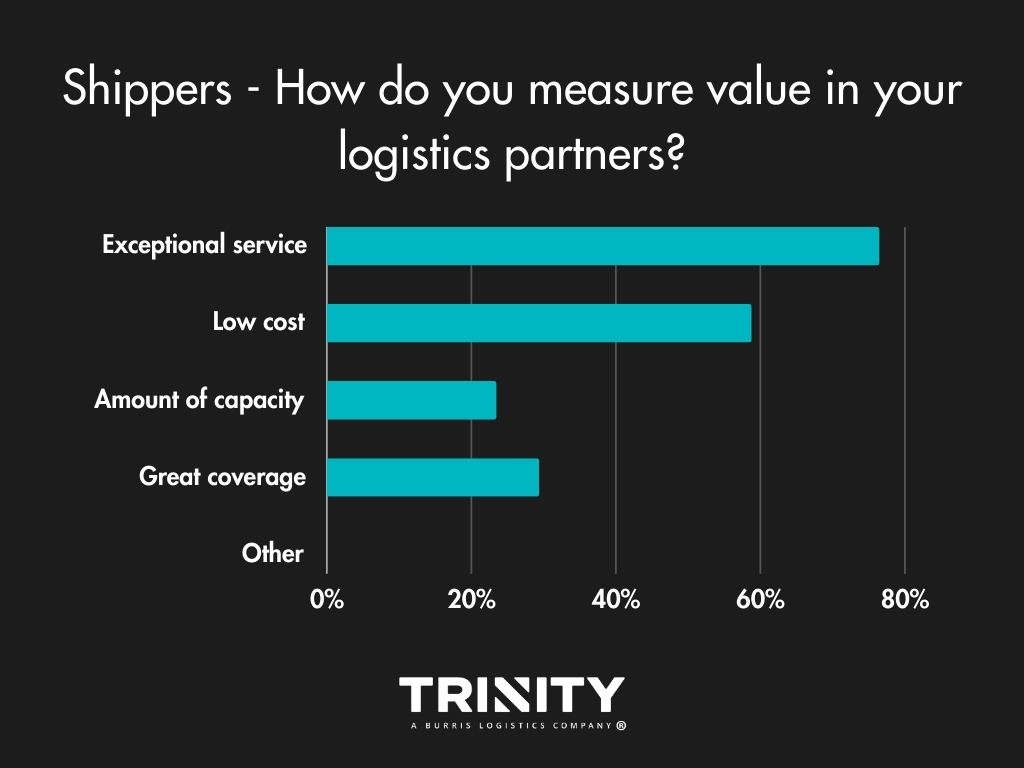
Most Wanted: Long Mileage, Flatbed Shipments
When it comes to mileage, most carrier companies tend to run long-hauls or a mix of short and long shipments. Flatbed hauls are the type of shipments most carriers like to haul with dry van coming in as a close second.
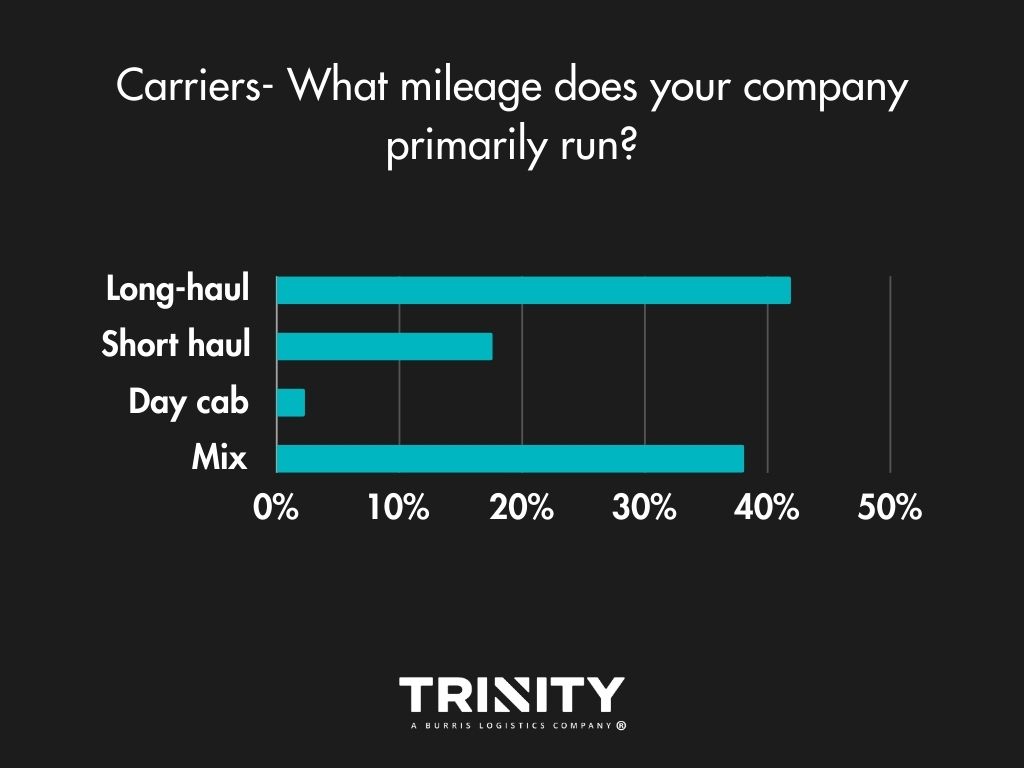
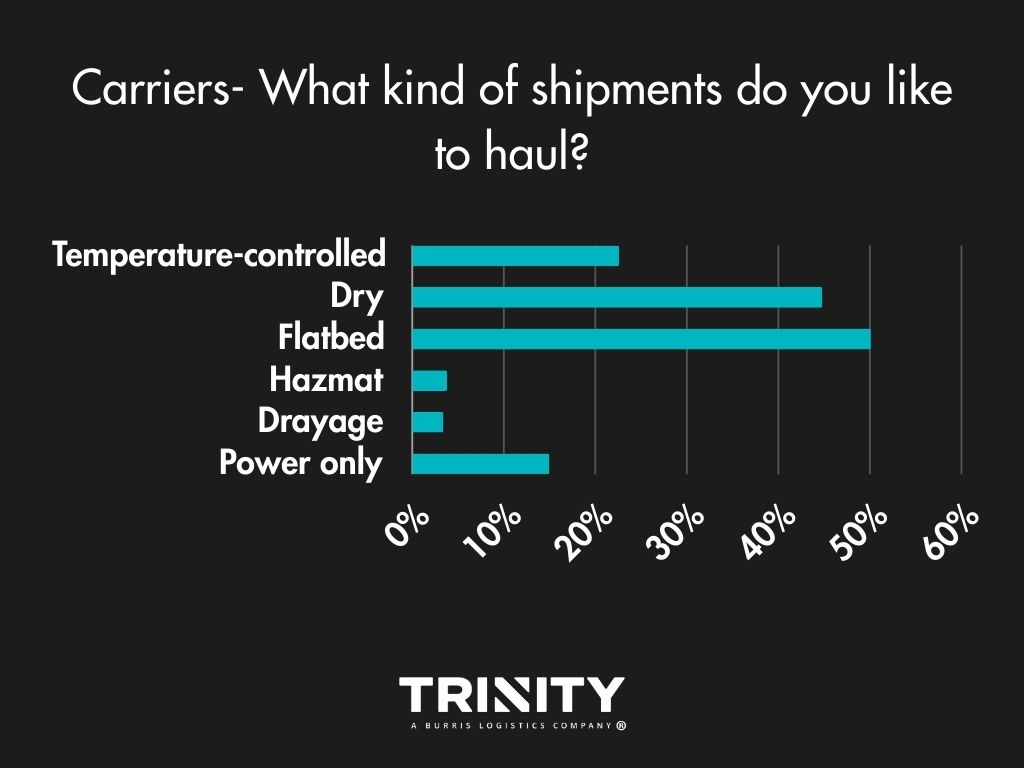
Load Boards are the Way
With 74 percent selecting this option, load boards are the norm for carriers to find available shipments. Sometimes they use their shipper relationships, and occasionally they make use of a 3PL.
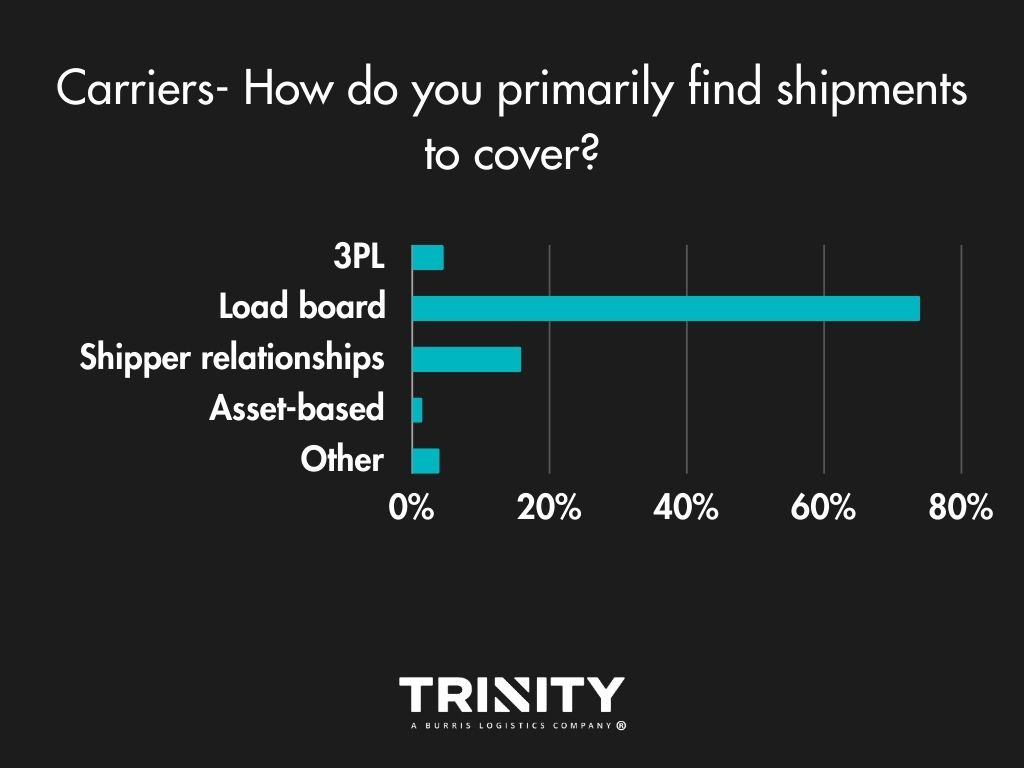
3PLs – Expanding a Carrier’s Reach
Carriers most often look to a 3PL for help with gaining access to available shipments that they wouldn’t have otherwise. Covering backhauls are another big reason carriers reach out to a 3PL.
For those that choose to not work with a 3PL, it’s often because of money; rates not being high enough. Surprisingly in the comments, many are not familiar with what a 3PL or freight broker is as well.
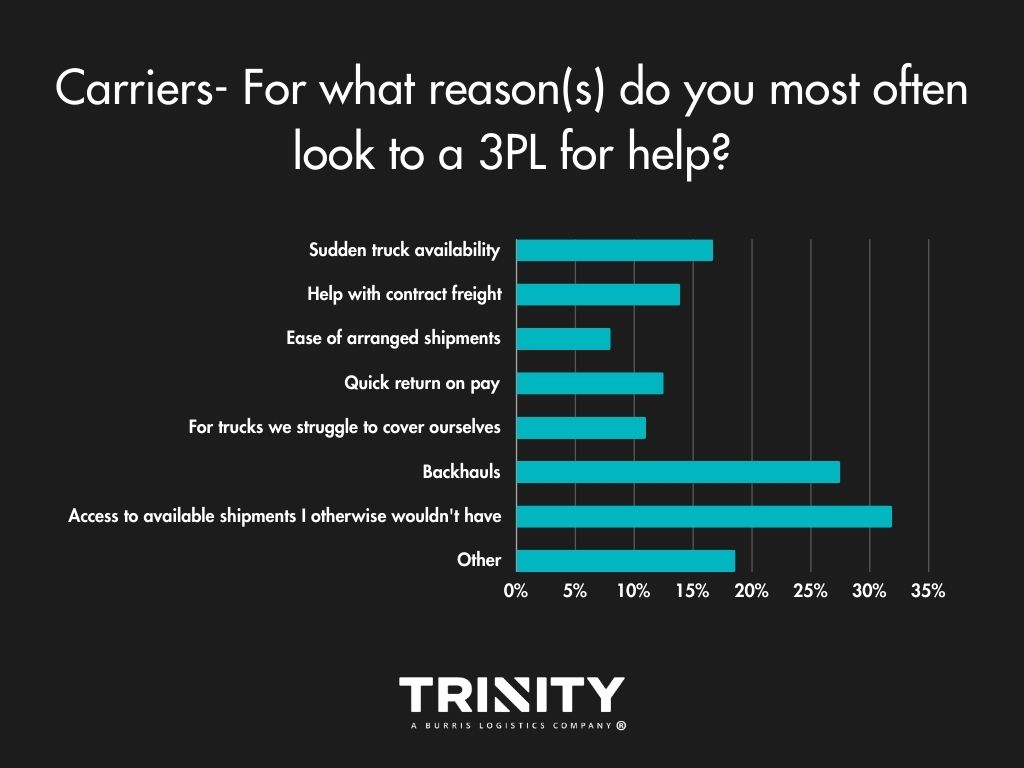
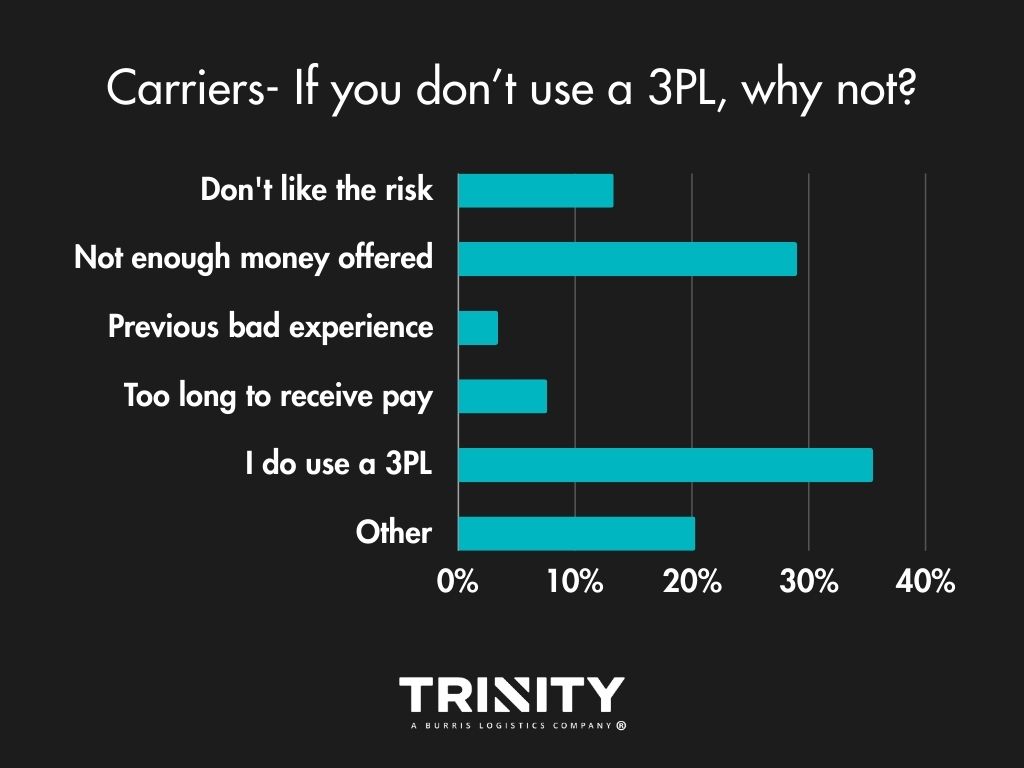
When it comes to measuring value in their 3PL partners, most carriers want good rates and great communication.
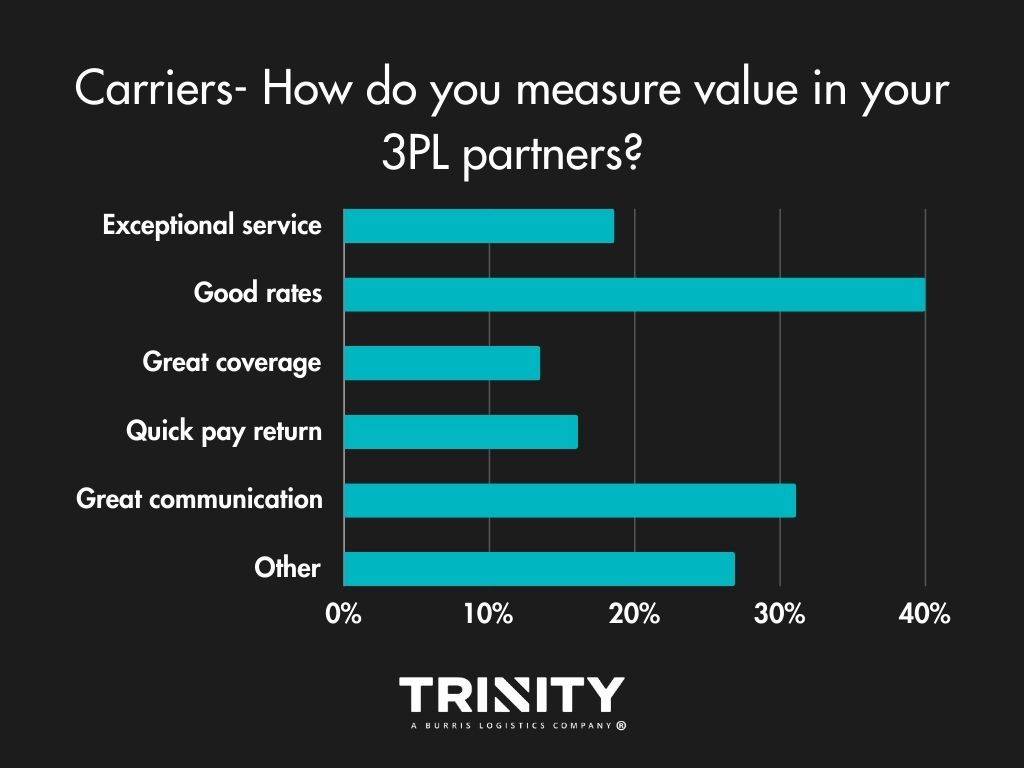
Fraud Concerns Growing
Fraud and scams have been growing in the industry, so we wanted to know what carriers think about it. Carriers are most worried about double and triple brokering affecting their businesses compared to concerns of identity theft or cargo theft.
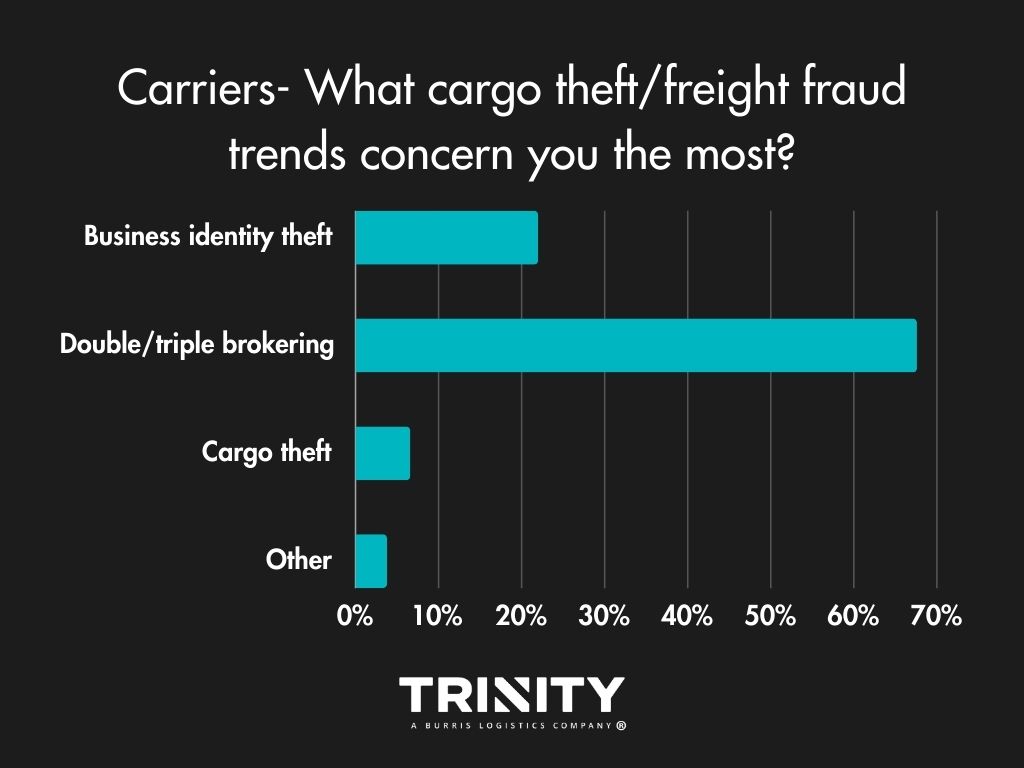
In recent years, the transportation industry has seen a concerning rise in cargo theft and fraud, and the culprits behind it are becoming increasingly sophisticated with their tactics. According to Land Line, cargo theft increased by 49 percent in the first quarter of 2020, with an average cargo loss value exceeding $105,000 per incident. In a recent report in July 2023 by CargoNet, it was found that supply chain risk events increased 57 percent year-over-year (YoY), accounting for 44 million in stolen shipments in quarter two of the calendar year.
With such alarming statistics, it’s essential to be proactive against cargo theft and freight fraud. So that you can be fully prepared, here are some of the most common methods used by criminals in cargo theft and fraud, along with proven strategies to prevent these issues from happening in the first place.
Common Cargo Theft and Fraud Scenarios
Dealing with cargo theft or fraud when shipping freight is far from ideal. It’s even more frustrating when you realize there are many ways for individuals to commit those crimes.
1. Identity Theft
Identity theft is currently one of the top methods scammers use to carry out fraudulent activities in the transportation industry. Scammers will impersonate legitimate trucking companies by using their stolen identities. Once they’ve acquired a stolen identity, scammers have several ways in which they use it. Some will pose as the trucking companies, show up to pick up the freight, and then disappear with the cargo. Others will request fuel advances, take the money, and vanish. Then you have others that will take it a step further and double broker.
2. Double Brokering
Double brokering is the unethical practice when a shipper or broker books a carrier for a shipment, and the carrier then brokers or tenders the shipment to a third party without the shipper’s or broker’s knowledge or approval. Double brokering not only raises liability concerns, such as a potential lack of insurance or approved contract with the actual carrier handling your freight, but it also results in a loss of control. If double brokering occurs, it can lead to billing and liability issues for you as the shipper or the freight broker.
3. Hook-Up-And-Go
This method of theft is precisely what it sounds like. Thieves connect tractors to trailers and simply drive away with them. These incidents typically occur at truck stops or drop yards when drivers are distracted. Although this method is less common today thanks to advanced technology and tracking systems in trailers, it’s still crucial to remain vigilant.
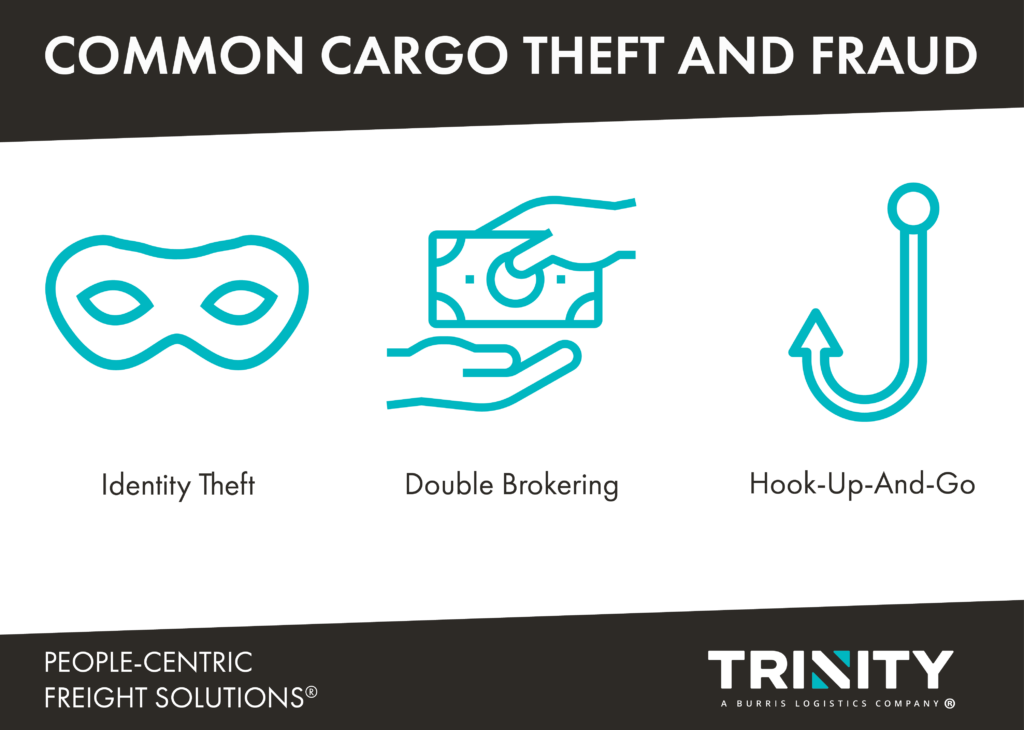
Combatting Cargo Theft and Fraud
When it comes to combating cargo theft and fraud, it can be challenging to know where to start. While securing trustworthy carriers is a solid initial step, several proven methods can help prevent fraud.
1. Communicate with the Drivers
Truck drivers are your first line of defense against cargo theft. Whenever possible, ensure that the drivers you work with have undergone proper screening to minimize the risk of fraud. It’s also important to keep your driver relationships informed about any cargo theft activities so they can stay vigilant against potential threats. Keep them aware of any hijacking hotspots and encourage them to report any suspicious incidents promptly. Additionally, if you employ drivers, ensure that they have received adequate training.
2. Verify Employment
Before finalizing any arrangements, always verify that the person you’re talking to is authorized from the logistics company they claim to work for. Use the Federal Motor Carrier Safety Administration (FMCSA) website to obtain the company’s contact information and speak to them directly to confirm their identity. If the company has no knowledge of the individual, it’s a red flag, and you’ve successfully avoided a potential scam.
3. Check Truck Identification
Legally, every motor carrier must display their company name and USDOT or MC number on the side of their truck, found on the door of the cab. If the name on the side of the truck doesn’t match the name of the company you’ve hired or that your freight broker has arranged on your behalf, it should raise immediate concerns with your dock workers. We strongly recommend implementing a procedure that requires your loaders to inspect the door and confirm a match. If there’s any discrepancy, the truck shouldn’t be loaded until the issue is resolved.
4. Leverage Technology
Technology can be a powerful ally when it comes to combatting cargo theft and fraud. GPS tracking can help locate a stolen vehicle, while geofencing applications can notify you if your freight deviates from its intended route. Making use of these kinds of technology can significantly reduce the risk of any cargo theft.
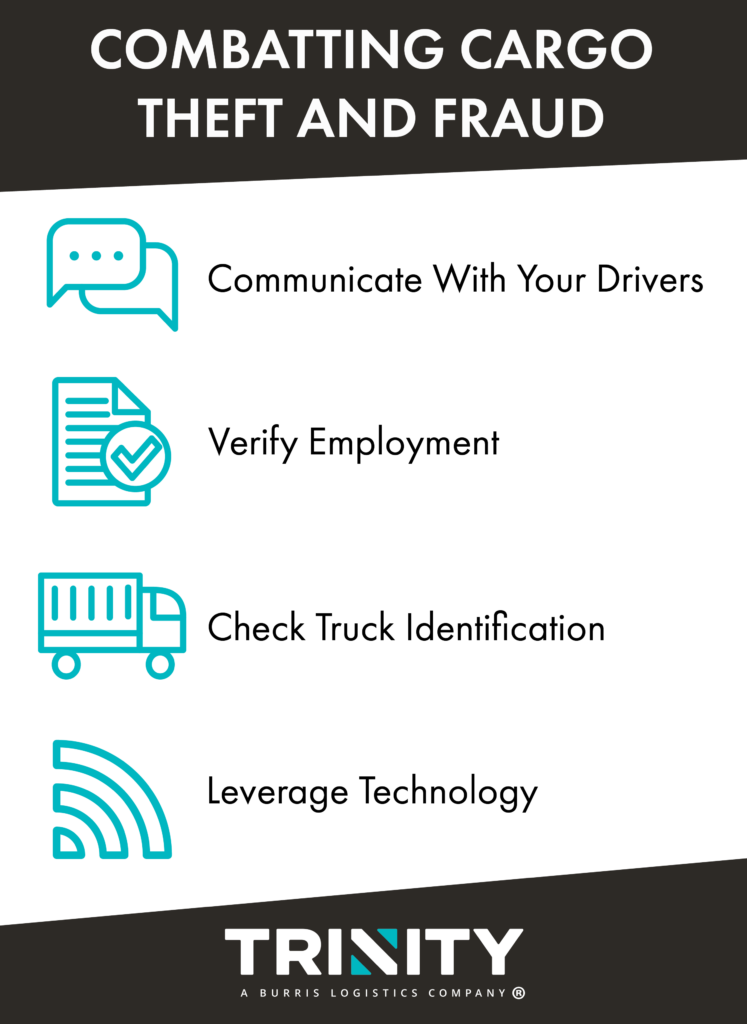
“Recently, Trinity Logistics had the opportunity to attend TIA’s Policy Forum in Washington, D.C. where we met with some of our elected state officials and staff,” said Kristin Deno, Director of Operational Risk. “We discussed the spike in fraud and impacts of cargo theft to the economy, which is estimated to have a cost of 800 million per year. Ultimately, these unsightly costs trickle down to the consumer, increasing the cost of goods for all. Because many double brokered or stolen loads begin with fake identity, verifying that you are communicating with the entity you think you are, is crucial. Newly created web domains and email addresses are being used to impersonate established carriers and even shipper businesses.”

Trust Trinity Logistics to Safeguard Your Shipments
Taking a proactive stance in fighting cargo theft and freight fraud is essential to ensure the safety of your shipments.
However, handling this task on your own can be burdensome. By partnering with a reliable 3PL like Trinity Logistics, you can save valuable time that would otherwise be spent on vetting carriers.
At Trinity, we meticulously verify all carrier relationships that we work with, not just during the initial setup, but for every shipment. Additionally, our strong relationships built with trusted carriers can further strengthen your confidence that your freight will arrive safe. Our Carrier Compliance and Carrier Development Teams are testaments to our focus on carrier verification and relationship building. We also offer cutting-edge tracking technology upon request, so you’ll know exactly where your freight is located at every step of the way.
Further, we take cases of cargo theft or fraud seriously. Situations where carriers are caught engaging in double brokering or identity theft are researched and offenders may be immediately placed on our Do-Not-Load (DNL) list.
Now, we understand that no matter what you do, things still sometimes happen. Even so, we’re proud to share that less than one percent of all shipments coordinated with Trinity Logistics end up in a claim. When that does happen, we’re just as prepared to tackle it. We have a Cargo Claims Department at the ready to assist you in navigating issues that may arise from your shipment with an average rate of 60 days in resolving cargo claims.
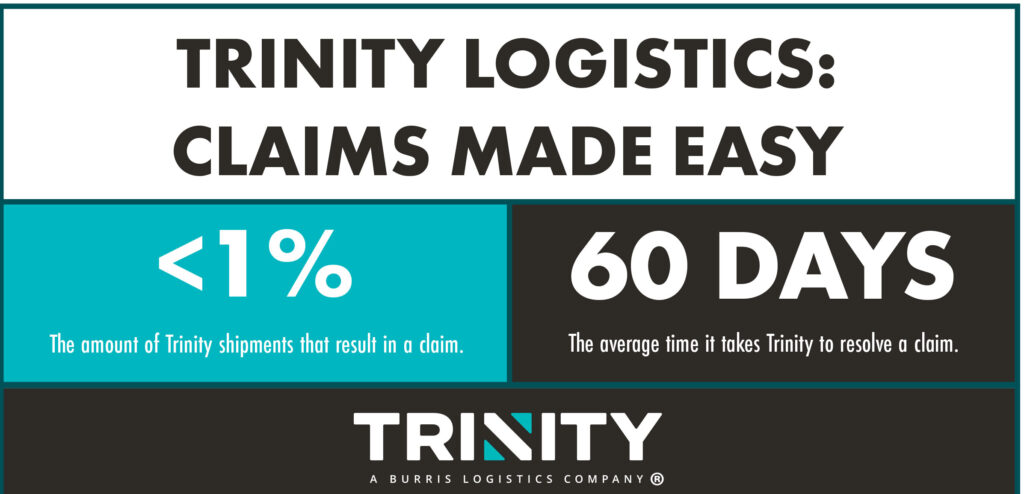
If the possibility of cargo theft and freight fraud is keeping you up at night, then consider working with Trinity Logistics so you can gain peace of mind over your freight shipments.
I want to know more about Trinity’s logistics services.